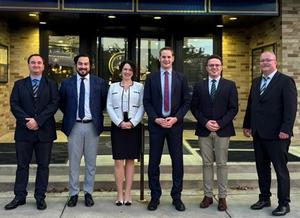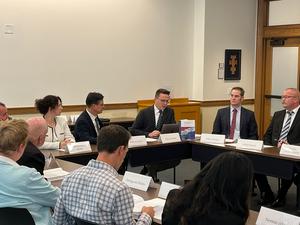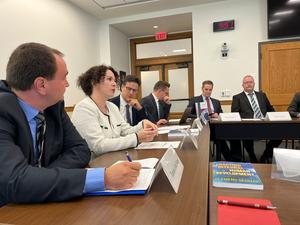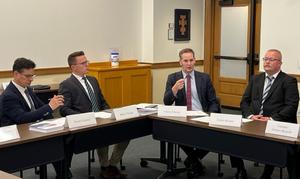The end of September marked a crucial milestone for the execution of LUPS’s internationalization plan for this year. After months of preparation, a delegation from Ludovika University of Public Service visited the University of Notre Dame. Vice-Rector Pier Paolo Pigozzi led the delegation that had a twofold objective: to bring across the Atlantic Hungarian scholarship on international affairs and to probe for areas of interinstitutional collaboration with the University of Notre Dame.
The visit to the United States was a success. The substantive areas of expertise and the regional networks of LUPS were valuable assets that our partners at Notre Dame acknowledged swiftly. As Vice-Rector Pigozzi recounts, “this initial visit quickly did away with unnecessary protocol. From the first day our meetings addressed concrete projects for collaborative research.”
The intense days of meetings at Notre Dame are only the tip of the iceberg of a semester-long work. A central part of the current plan for strengthening LUPS international collaboration is the dissemination of our research outcomes and distinctive Hungarian viewpoints on the common good, statecraft and international affairs. In this light, the edited volume on The 2024 Hungarian EU Presidency was the most pertinent piece of recent LUPS’s scholarship for a book launch discussion at Notre Dame.
Balázs Tárnok, a co-editor of the book and Director of Research at the John Lukacs Institute for Strategy and Politics, was central in the preparatory efforts. Director Tárnok, met regularly with Vice-rector Pigozzi to identify LUPS’s areas of interest and strength around the main topics of the volume. If the transatlantic travels were going to be worthwhile, the meetings at Notre Dame had to exceed protocolar statements and signal priority areas for collaboration.
Tárnok and Pigozzi carefully chose the rest of the delegation among the coauthors of the volume. Just as the visit to Notre Dame had the double purpose of presenting distinctive Hungarian scholarship for academic debate and to look for areas for mutual growth, the delegation of scholars fulfilled the double role of presenting a sample of their writings and of being LUPS’s ambassadors on their areas of expertise.
The book launch discussion was hosted by the Notre Dame Nanovic Institute for European Studies. The event brought together more than twenty experts from various departments across the University, as well as visiting scholars. Balázs Tárnok, co-editor of the volume, opened the event with a presentation on the book’s methodology and broader aims. After him, the four authors of selected chapters presented their works on the EU’s sanctions policy (by Réka Máthé), the EU’s global competitiveness (by Gábor Kutasi), the EU’s foreign and security policy (by Tamás Csiki), and Hungary’s migration policy (by Viktor Marsai). Their presentations were received by careful academic comments and lively debate over different perceptions on the Hungarian EU Presidency and its policy priorities.
As Vice-rector Pigozzi explains, the current plan for the internationalization purposely builds upon LUPS’s distinctive mission and the values that are central for Hungarian public service to its nation. LUPS’s mission statement stresses our care for the “respect for Christian values and the cultural traditions of other nations, tolerance, and the protection of individual freedom and human dignity”. At LUPS both, the understanding of human dignity and our academic endeavors are broadened by the foundational Christian identity that is at the heart of the history of Hungary.
Correspondingly, University of Notre Dame is one of the 71 premier research institutions of the Association of American Universities, and it is the only one with a Christian institutional identity in that group. In his Inaugural Speech, the new President of Notre Dame, Rev. Robert A. Dowd, C.S.C., delved into how academic excellence in Notre Dame is rooted in Christian ideals of respect for human dignity and the unity of knowledge is in the best position to foster reasoned, constructive conversations. President Dowd further explained that Notre Dame must build bridges by reinforcing our commitment to be a community of learning that is not afraid to tackle the most contested issues of the day. Where we are grounded but not bounded by disciplines; where openness to questions does not mean we are afraid to stand for something; where we think about, and reflect together on, the values that truly endure.
At LUPS, we, too, cherish these Christian values and we are proud to stand for our Hungarian tradition while we remain open in the pursue of knowledge and in our commitment to serving a Europe –and a world– of nations.
A few days after our visit to Notre Dame ended, we started to see the first fruits in common undertakings in building bridges in the fields of Peace Studies, with the Kroc Institute for Peace Studies, the Notre Dame International Security Center, and in European Studies with the Nanovic Institute and the John Lukacs Special Collection at Hesburgh Libraries. For the near future, the areas of potential collaboration in reinforcing our commitment to be a community of learning, and sowing seeds of reconciliation extend over teachers' training, sustainability, human rights, diplomacy studies and global affairs.



